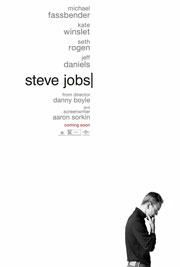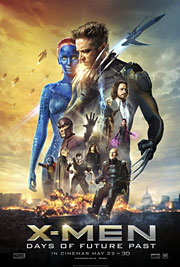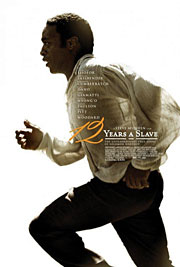Movie Review: “Steve Jobs”
Posted by David Medsker (10/22/2015 @ 10:00 am)
Michael Fassbender, Kate Winslet, Seth Rogen, Jeff Daniels, Katerine Waterston, Michael Stuhlbarg, John Ortiz
Danny Boyle
Most biopics go to great lengths to humanize their subjects, to show that even the great ones are flawed in some way. “Steve Jobs” sets its subject on fire, and then pokes the body with a stick for 122 minutes. They make it clear from word one that Jobs was a sociopath, blinded by ambition and seemingly incapable of empathy or love. He was an insufferable boss and an even worse father, yet the son of a bitch changed the world.
And the thing is, those are all okay elements to include in the film of someone’s life. More often than not, though, those pieces aren’t the whole story. Here, they are, and it’s framed within a narrative that seems designed to make the audience even more uncomfortable. “Steve Jobs” is well written and well-acted, but it is not an easy movie to like, let alone love. It challenges the audience, and that is an admirable thing, as long as they’re willing to suffer the consequence that people may ultimately decide that they don’t like the movie because the supposed protagonist is an unrepentant jerk.
The film covers three product launches, peppered with a few informative, non-linear flashbacks, over the course of 14 years. The first one takes place in 1984, where Jobs is about to launch the Macintosh. Ridley Scott’s “1984” ad during the Super Bowl had everyone talking, and now it is up to Jobs to deliver. The only problem is, the Mac isn’t ready, and yet he still tells the press that he anticipates record-shattering sales. Before he makes his presentation, though, he has to deal with Chrisann Brennan (Katherine Waterston), mother of Jobs’ daughter Lisa, though he refuses to acknowledge Lisa as his daughter. Next up is Steve Wozniak (Seth Rogen), the man with whom he invented the first Apple computer in a garage, and the two are still quibbling over what turned out to be game-changing innovations that Jobs rejected out of hand.
Read the rest of this entry »
Movie Review: “X-Men: Days of Future Past”
Posted by Jason Zingale (05/24/2014 @ 12:12 pm)
Hugh Jackman, James McAvoy, Michael Fassbender, Jennifer Lawrence, Nicholas Hoult, Peter Dinklage
Bryan Singer
Just when it seemed like Fox was engineering a smart reboot of its X-Men franchise with “First Class,” the series’ original director, Bryan Singer, has returned to combine the old with the new in “X-Men: Days of Future Past.” That’s not exactly bad news for fans who appreciate the lengths that Singer has gone to in an attempt to fix the continuity issues within the X-movies, but by doing so, he’s tethered the prequels to the earlier films in a way that ensures they’ll never be able to exist on their own. And considering the potential of where the franchise was headed prior to this “sidequel,” it’s a little disappointing to see Singer turn his back on that initial vision. Granted, there’s still quite a bit to like about “Days of Future Past,” but it feels more like a step backward than the creative leap forward that Matthew Vaughn’s prequel pointed towards.
In the near future, mutants are being hunted down by advanced versions of Sentinel robots that can instantly adapt to any situation, making them impossible to defeat. With only a handful of X-Men remaining, Kitty Pryde (Ellen Page) uses her powers to send Logan’s (Hugh Jackman) consciousness back in time to his younger body circa 1973 in order to reunite Charles Xavier (James McAvoy) and Magneto (Michael Fassbender) for a single purpose: stopping Mystique (Jennifer Lawrence) from murdering the creator of the Sentinel program, Dr. Boliver Trask (Peter Dinklage), in the hope that it will alter the course of history. Meanwhile, the X-Men from the future must hold off an impending Sentinel attack to provide Logan enough time to complete his mission, although that’s much easier said than done.
Read the rest of this entry »
Movie Review: “12 Years a Slave”
Posted by Jason Zingale (10/26/2013 @ 10:33 am)
Chiwetel Ejiofor, Michael Fassbender, Lupita Nyong’o, Sarah Paulson
Steve McQueen
If the critics at this year’s Toronto International Film Festival had their way, “12 Years a Slave” would win the Academy Award for Best Picture, despite the fact that there are still plenty of Oscar hopefuls yet to be released. That kind of short-sightedness and hyperbolic mentality is exactly what’s wrong with the dog and pony show we call awards season, because while Steve McQueen’s historical drama may tick several of the requisite boxes for a typical Oscar-winning movie, it’s far too early to make that call. You can praise the film’s realistic depiction of slavery all you like, but just because “12 Years a Slave” is hard to watch doesn’t necessarily mean that it’s deserving of the top prize.
Based on the 1853 memoir of the same name, the film recounts the tale of Solomon Northup (Chiwetel Ejiofor), a free black man living with his wife and children in Saratoga, New York in 1841. Well-educated and a talented violinist, Solomon is invited to Washington, D.C. by a pair of circus promoters who offer him a lucrative job playing at one of their shows. Upon arriving in the capital city, Solomon is wined and dined by the two men, only to awaken the next morning to find himself shackled and charged as a fugitive slave from Georgia. Despite his claims that he’s a free man, Solomon is wrangled up with other “fugitives” and shipped to a slave trader in the South, who then sells him to a kindly plantation owner named William Ford (Benedict Cumberbatch). But when Solomon causes trouble with one of Ford’s white employees, he’s sold again, this time to Edwin Epps (Michael Fassbender), a decidedly more malicious owner with a reputation for breaking the spirits of any slave under his rule.
Read the rest of this entry »













